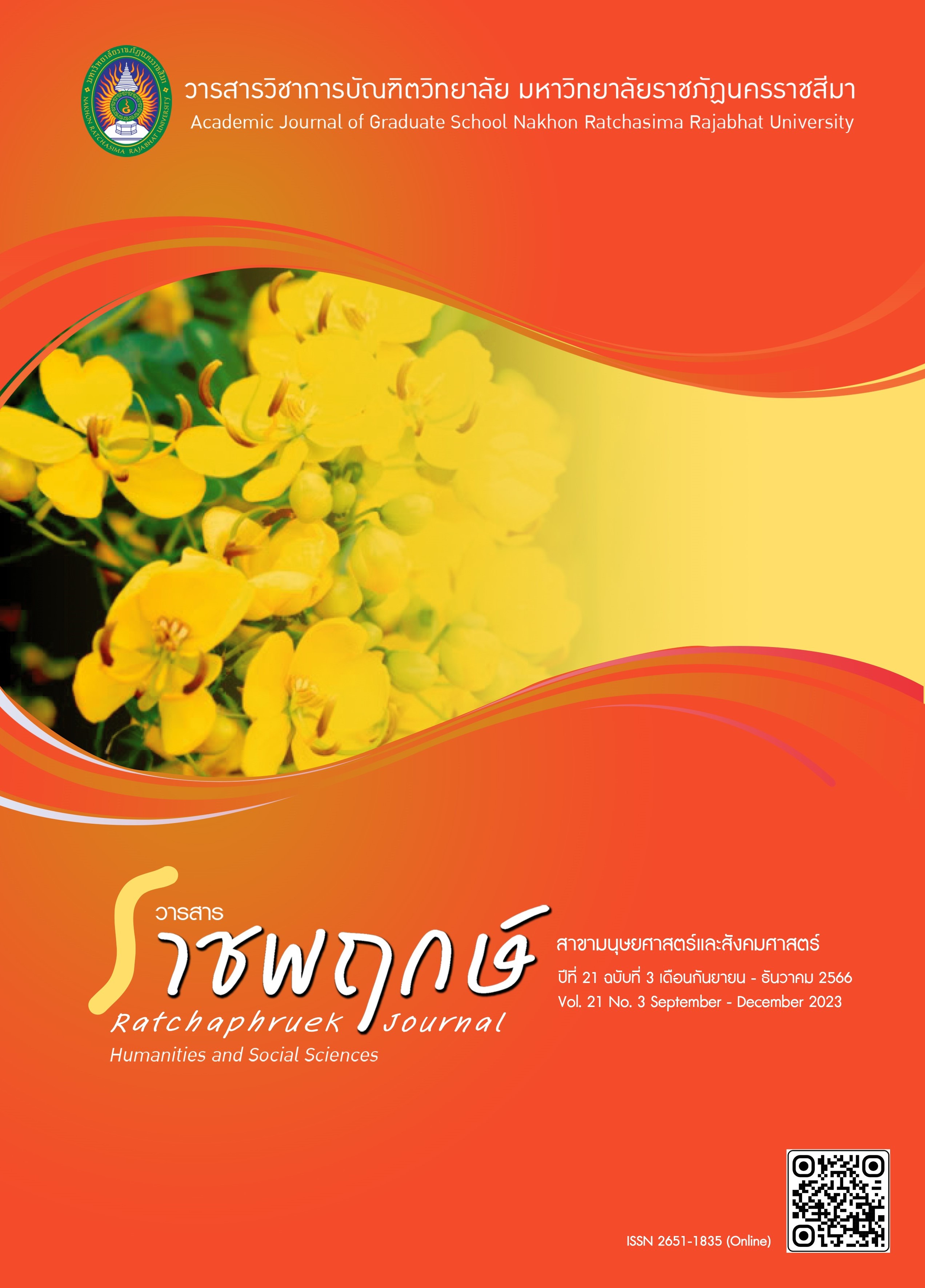Implementing Isan Festival through Task-Based Learning to Promote Grade 5 Students’ English Reading Comprehension
Main Article Content
Abstract
The research objectives of this study were: 1) to examine the effects of task-based learning focusing on the Isan festival on English reading comprehension of fifth-grade students, and 2) to study students’ satisfaction towards learning English via task-based learning focusing on the Isan festival. The participants were 29 fifth-grade students, who were selected by using cluster random sampling. The instruments were the English lesson plans based on task-based learning focusing on the Isan festival, an English reading comprehension test, and a questionnaire. The data were analyzed using mean (), standard deviations (S.D.), and pair-sample t-test. The result of this research showed that the mean score of the post-test of the English reading comprehension of the participants who learned English using task-based learning focusing on the Isan festival was significantly higher than the pre-test at the .05 level. In addition, the participants had high satisfaction with learning English via task-based learning focusing on the Isan festival. This study confirmed that using task-based learning focusing on the Isan festival could enhance students’ English reading comprehension.
Article Details

This work is licensed under a Creative Commons Attribution-NonCommercial-NoDerivatives 4.0 International License.
References
Chaiwong, T. (2021). The effects of task-based learning and collaborative strategic reading instruction in enhancing reading comprehension of Mattayomsuksa 2 students (Master’s thesis, Srinakharinwirot University).
Chen, S. & Wang, J. (2019). Effects of Task-based Language Teaching (TBLT) Approach and Language Assessment on Students’ Competences in Intensive Reading Course. English Language Teaching, 12(3), pp. 119-138.
Ellis, R. (2003). Task-Based Language Teaching and Learning. Oxford: Oxford University Press.
Kokkratok, W. (2017). Effects of task-based learning using ASEAN cultural content on English reading comprehension of ninth-grade students (Master's thesis, Nakhon Ratchasima Rajabhat University).
Lailiyah, M., Wediyantoro, P. L. & Yustisia, K. K. (2019). Pre-Reading strategies on Reading comprehension of EFL Students. EnJourMe (English Journal of Merdeka), 4(2), pp. 82-87.
Lornklang, T. (2020). A Development of English for Local Tourism Instructional Model in Nakhon Ratchasima Province. Ratchaphruek Journal, 19(1), pp. 48-57.
Ministry of Education. (2008). The Basic Education Core Curriculum B.E.2551. Bangkok: Author.
Ngam-anant, P. & Patamadilok, S. (2022). The effectiveness of task-based learning in English reading comprehension ability of grade 6 students. Buddhist Education and Research, 8(2), pp. 94-105.
Nunan, D. (2004). Task-Based Language Teaching. Cambridge: Cambridge University Press.
Petnoosed, P. & Palanukulwong, T. (2021). The Effects of Cultural Familiarity on Reading Comprehension and Attitudes Towards Reading English Short Stories Written by a Native Speaker and a Thai Author. Journal of Liberal Arts Prince of Songkla University, 13(2), pp. 120-143.
Sornprasert, S. & Chussanachot, R. (2019). Development a reading Instructional model based on the Schema Theory and Reciprocal Teaching Approach to enhance the English reading ability of Secondary School Students. Journal of Education Studies, 47(1), pp. 429-449.
Srichote, P. (2022). Enhancing English reading comprehension of Thai secondary school students through the integration of technology into task-based language teaching (Master's thesis, Srinakharinwirot University).
Thammabowon, N. (2006). Curriculum for Kindergarten Development: Experience Management for Kindergarten. Nonthaburi: Sukhothai Thammathirat University Press.
Willis, D. (1996). A Framework for Task-Based Learning. London: Longman.
Wisaijorn, P. (2015). Teaching Reading. Bangkok: Chulalongkorn University Printing House.


